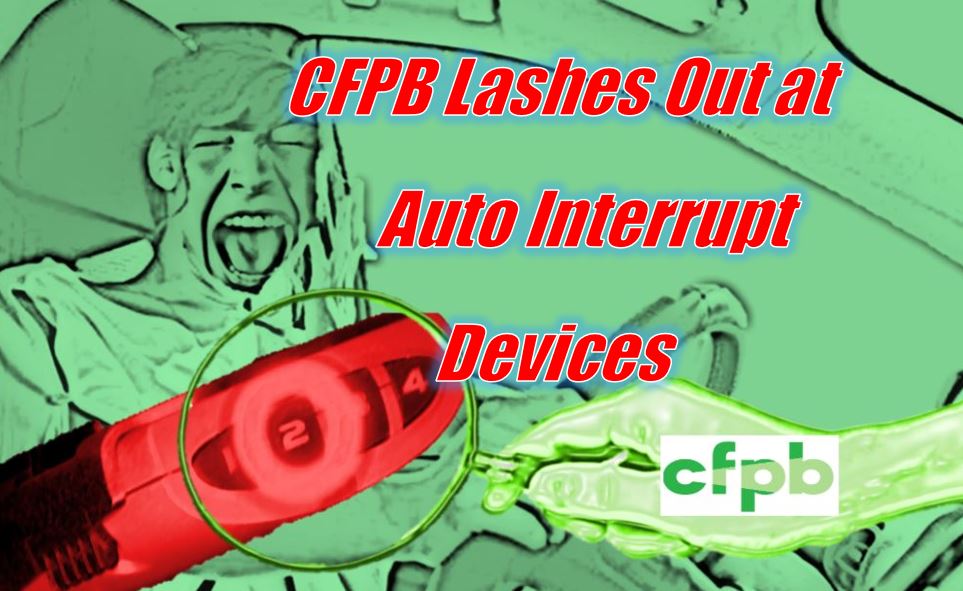
CFPB Fall Supervisory Highlights: The harm outweighed any countervailing benefits to consumers or competition.
On November 16th, the Consumer Financial Protection Bureau (CFPB) released their Fall Supervisory Highlights. Within its thirty-two pages of findings are, as usual, their observations and opinions on a number of loan servicing issues. This quarter, they take aim at auto interrupt devices, double charging collateral protection insurance and the usual issues of collections calls including allegations of deceptive representations during collection calls.
Read the Entire Publication Here!
Highlights
2.1.3 Double billing consumers for collateral protection insurance
When consumers enter auto finance agreements, they generally agree to maintain vehicle insurance that covers physical damage to the property in order to protect the lender’s interest in the collateral. Some contracts allow servicers to purchase insurance, called Collateral Protection Insurance (CPI) or Force-placed Insurance (FPI), if the consumer fails to maintain appropriate coverage; charges for CPI are generally passed along to consumers.
Examiners found that servicers engaged in an unfair act or practice when they double billed consumers for CPI charges. Servicers purchased CPI and billed consumers for a certain amount. Servicers then charged consumers twice for the CPI in error; billing and collecting these charges caused, or was likely to cause, substantial injury to consumers. Consumers could not reasonably avoid the injury, and it was reasonable for consumers to rely on the billed amount. The injury associated with billing consumers for erroneous amounts is not outweighed by any countervailing benefits to consumers or competition.
In response to these findings, servicers proposed implementing changes to address the violation.
2.1.4 Unfairly engaging devices that interfered with driving
When consumers enter into auto finance agreements, lenders sometimes require consumers to have technologies that interfere with driving (sometimes called starter interrupt devices) installed in their vehicles. These devices, when activated by servicers, either beep or prevent a vehicle from starting.
Examiners found that, in certain instances, servicers engaged in unfair acts or practices by activating these devices in consumers’ vehicles when consumers were not past due on payment, contrary to relevant contracts and disclosures. Servicers inappropriately activated the devices due to errors with their internal systems.
In these instances, servicers caused injury in one of two ways. First, in some instances they activated the devices and prevented consumers from starting their vehicles, causing substantial injury by unexpectedly depriving these consumers of their vehicles. Second, in some instances servicers caused the devices to sound late payment warning beeps despite consumers being current, often for several days.
The devices sounded these beeps each time the consumer started the car. This caused, or was likely to cause, substantial injury to consumers because they may have ceased using the vehicle because they understood from the beeps that servicers might disable the vehicle. Additionally, the warning beeps were likely to harass consumers and risk harming consumers’ reputations by communicating to others, the consumers’ purported delinquencies.
Consumers could not reasonably avoid these injuries because they had no control over servicers’ activation of the devices. The harm outweighed any countervailing benefits to consumers or competition.
In response to these findings, servicers proposed implementing changes to address the violations
2.1.5 Making deceptive representations during collection calls
Examiners found that certain servicers made deceptive representations during collections calls. Specifically, servicers’ representatives told delinquent consumers that their driver’s licenses and tags would be or may be suspended if they did not make a prompt payment to the servicer. In fact, servicers do not have authority to suspend consumers’ driver’s licenses and tags.
Additionally, examiners found that some representatives told consumers that their accounts had, or would be, transferred to the legal department. In fact, consumers’ accounts were not at risk of imminent referral to the legal department. In these instances, servicers engaged in deceptive acts or practices. It was reasonable for consumers to believe that servicers had the authority to take the actions they threatened to take and would take those actions. And the representations were material because they were likely to impact consumers’ choices regarding whether to pay their auto loans or other debts.
In response to these findings, servicers remediated impacted consumers and enhanced training, procedures, and call monitoring related to collection activity.
2.4 Debt Collection
The Bureau has supervisory authority to examine certain institutions that engage in consumer debt collection activities, including very large depository institutions,32 nonbanks that are larger participants in the consumer debt collection market,33 and nonbanks that are service providers to certain covered persons.34 Recent examinations of larger participant debt collectors identified violations of the Fair Debt Collection Practices Act (FDCPA).
2.4.1 Harassment regarding continued call conversations
During calls with consumers, examiners found that debt collectors engaged in conduct the natural consequence of which was to harass, oppress, or abuse the person with whom they were communicating. In these calls, examiners found that the debt collectors continued to engage the consumers in telephone conversations after the consumers stated that the communication was causing them to feel annoyed, harassed, or abused.
Examiners found that in at least one call, the debt collector continued to engage the consumer after the consumer stated multiple times they were driving and needed to discuss the account at another time. In another instance, examiners found that the debt collector used combative statements and continued the call after the consumer stated they were unemployed, affected by COVID-19, and unable to pay, and even after the consumer clearly stated that the call was “making him agitated”. By continuing the calls after the consumers expressed their desire to no longer engage with the collector, the debt collectors violated the FDCPA’s prohibition against harassing and abusive conduct.
In response to these findings, Supervision directed the debt collectors to enhance their training requirements to ensure compliance with Federal consumer financial law including the FDCPA.
2.4.2 Communication with third parties
Examiners found multiple instances in which debt collectors violated the FDCPA by communicating with a person other than the consumer about the consumer’s debt when the person had a name similar or identical to the consumer.
In response to these findings, Supervision directed the debt collectors to update their identity authentication procedures to ensure that the person with whom the debt collector is communicating is the consumer obligated or allegedly obligated to pay the debt.
Fines
And, of course no CFPB Supervisory Highlights bulletin would be complete without announcing the millions they’ve fined to fund the CFPB from their exams. This quarters lucky recipients are;
Regions Bank
On September 28, 2022, the CFPB ordered Regions Bank to pay $50 million into the CFPB’s victims relief fund and to refund at least $141 million to consumers harmed by its illegal surprise overdraft fees. Until July 2021, Regions charged customers surprise overdraft fees on certain ATM withdrawals and debit card purchases.
The bank charged overdraft fees even after telling consumers they had sufficient funds at the time of the transactions. The CFPB also found that Regions Bank leadership knew about and could have discontinued its surprise overdraft fee practices years earlier, but they chose to wait while Regions pursued changes that would generate new fee revenue to make up for ending the illegal fees.
This is not the first time Regions Bank has been caught engaging in illegal overdraft abuses. In 2015, the CFPB found that Regions had charged $49 million in unlawful overdraft fees and ordered Regions to make sure that the fees had been fully refunded and pay a $7.5 million penalty for charging overdraft fees to consumers who had not opted into overdraft protection and to consumers who had been told they would not be charged overdraft fees.
Trident Mortgage Company, LP
On July 27, 2022, the CFPB and U.S. Department of Justice (DOJ) took action to end Trident Mortgage Company’s intentional discrimination against families living in majority-minority neighborhoods in the greater Philadelphia area. The CFPB and DOJ allege Trident redlined majority-minority neighborhoods through its marketing, sales, and hiring actions. Specifically, Trident’s actions discouraged prospective applicants from applying for mortgage and refinance loans in the greater Philadelphia area’s majority-minority neighborhoods.
On September 14, 2022, the court entered the consent order that, among other things, requires Trident to pay a $4 million civil penalty to the CFPB to use for the CFPB’s victims’ relief fund. The Attorneys General of Pennsylvania, New Jersey, and Delaware also finalized concurrent actions.
CFPB Lashes Out at Auto Interrupt Devices – Consumer Financial Protection Bureau – CFPB










